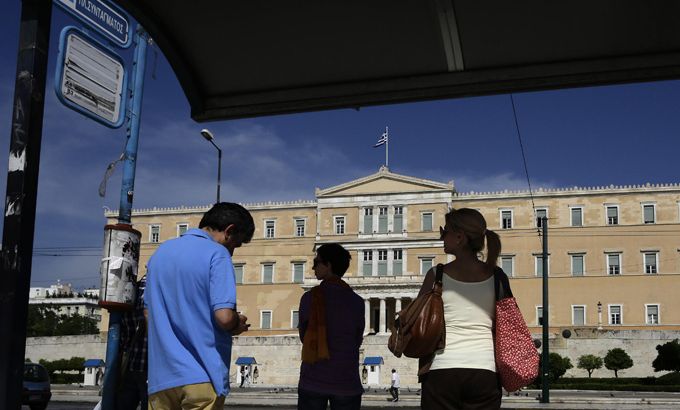Greek leftists in bid to form coalition
Anti-austerity Syriza party in talks to form a government after conservative New Democracy party fails in its attempt.

Greece’s radical leftist Syriza party is to start trying to build an anti-austerity cabinet and prevent fresh elections, a day after the conservatives failed to form a coalition government.
Alexis Tsipras, Syriza’s leader, is holding talks with President Carolos Papoulias on Tuesday and will be given three days to form a government.
The meeting comes as debt-laden Greece faces stern warnings from Germany and the EU to stick to its bailout deal.
“We will exhaust all possibilities to reach an understanding, primarily with the forces of the left,” Tsipras said ahead of the meeting.
The conservative New Democracy party’s failure to form a government underscored Greece’s precarious situation, with the country needing bailout funds to stay afloat, but where painful austerity measures have given rise to widespread voter anger.
The euro and world stock markets sank on Monday after voters kicked out the Greek government in weekend elections and voted in a Socialist president of France in a backlash against austerity, but Asian markets rebounded Tuesday.
Al Jazeera’s John Psaropoulos, reporting from Athens, said: “There are fewer chances today, I think, of forming consensual government than we had yesterday when the largest party, the Conservatives, was trying its hands at it.”
“Today it’s the radical left, Syriza, who really want a sort of leftist coalition of the communists and other left parties.
“There is a great deal of digesting to be done of the results here. The idea that Greece doesn’t have a stable government is still sinking in.”
Fiscal pact
The political developments in France and Greece had stoked anxiety about the fate of the EU’s tough fiscal pact adopted in March to try to end the eurozone’s crippling debt crisis.
New Democracy leader Antonis Samaras said on Monday his efforts to form a “national salvation” administration had failed, meaning that Syriza, as the runner-up in Sunday’s election, would now be tasked with forming a government.
|
|
“I did whatever I could to secure a result but it was impossible,” Samaras said in a televised address after a day of separate meetings with fellow leaders.
Samaras, 60, was rebuffed by Syriza and the small Democratic Left group, while the nationalist Independent Greeks and the Communist party refused to even meet with him.
Third-placed socialist party PASOK, which was formerly in a coalition with New Democracy, agreed to co-operate but only if the leftists also joined.
The snub to Samaras suggests that Greece’s political parties are paying more attention to the punishing message sent by voters fed up with austerity measures than to worries about the future of the euro or warnings from Berlin and Brussels.
German Chancellor Angela Merkel, the chief proponent of austerity as the main way out of the eurozone crisis, said on Monday that it was “of utmost importance” that Greece stuck to its reform path, although conceding this was “difficult”.
A spokeswoman for the European Commission said Brussels “hopes and expects that the future government of Greece will respect the engagements that Greece has entered into”.
‘New elections’
Tsipras, who described the election results as a “message of overthrow”, has said he would seek to form a left-wing coalition to reject the “barbaric” measures of the EU-IMF loan agreement that saved Greece from fiscal collapse.
The country, in its fifth year of recession with unemployment at 20 per cent, is committed to finding in June another $15bn in savings over the next two years.
New Democracy and PASOK, which have alternated in power since 1974, saw their share of the vote collapse to 32.1 per cent on Sunday from 77.4 per cent at the last election as voters supported instead a raft of anti-austerity parties.
This left the two parties, which favour sticking to the bailout but with easier terms, with 149 MPs in the 300-seat parliament, insufficient for a re-run of the outgoing coalition led by technocrat Lucas Papademos.
Instead, voters angry after two years of cuts handed parties wanting to tear up the agreements a total of 151 parliamentary seats between them, including the leftist Syriza, which with 52 seats relegated PASOK to third place.
The others included the far-right Golden Dawn with 21 seats, the right-wing Independent Greeks with 33 MPs and the communist KKE with 26.
Berenberg Bank economist Holger Schmieding warned there was a risk that “Europe could turn off the flow of support funds and thus force Greece to leave the euro”.
Economist Guillaume Menuet of Citi said there was “significant potential” for Greece to miss its next round of targets and a 50-to-75-per cent chance of what he called a “Grexit” within 12 to 18 months.